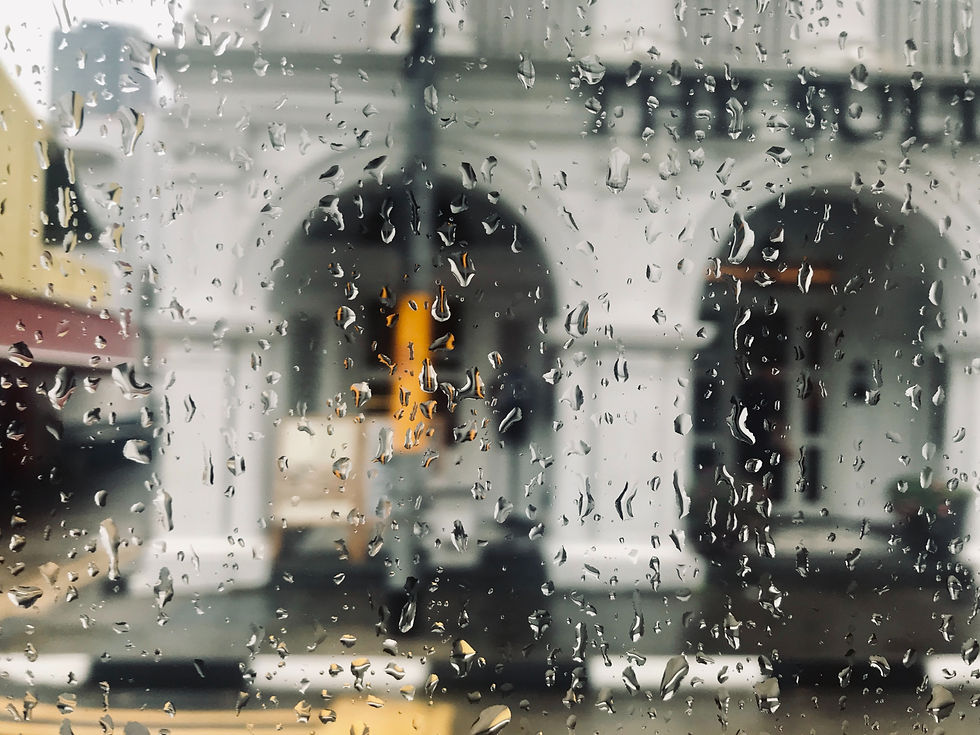
Writer Moe Yin gives us food for thought on something we have all encountered: rain on Sundays
In the hot and humid Singapore, rain is often welcomed by the masses. Just like most people, I love the cooling rain when I am indoors and dislike it when I am out. Struggling to hold my umbrella in one hand and laptop in the other, while simultaneously trying to shield my bag from the rain is one irritating and troublesome situation.
From Monday to Saturday, my feelings only go as far as annoyance. However, it extends to hatred on Sundays. That is because rain on Sundays, the unofficial rest day for migrant domestic workers (MDWs) in Singapore, foils their social activities.
Rain often unveils a lot about the society we live in. The Oscar-winning Korean film, Parasite, depicted a thunderstorm as one that destroyed the home of the poor Kim family. The same rain was treated as a blessing to the rich ー a crisp and clear distinction of the social classes.

Perhaps it is a little dramatic to draw parallels between the symbolic flood scene in Parasite and Singapore society. However, if you have ever been to Lucky Plaza, Peninsula Plaza or any park on a rainy Sunday, you may better understand why I say so. The rain reveals, in a more tangible manner, where social divides may exist.
On Sundays, many MDWs go out to catch up with their friends and family in person or over the phone. Often, their social activities take place in the form of ‘picnics’ which entail activities that go beyond eating, such as dancing, crafting, learning or singing. Although resting at home seems like a relatively good choice after working a whole week (that’s if you’re lucky enough to have employers who give a weekly rest day or are compensated otherwise, as mandated by the Ministry of Manpower), many MDWs prefer not to do so.

Picnics are a relatively economical social activity compared to going to malls or eating out which typically incur higher costs. Some MDWs also pointed out that they feel more comfortable resting outside than in their employer’s homes. This could explain why some MDWs could be seen napping in public spaces and not feel conscious of the gaze of passers-by. Apart from comfort, the outside environment is also a place where they can fully rest and not feel obligated to attend to chores by virtue of the fact that they are home.

Rain on Sundays dampens their spirits. Additionally, they have to deal with patronising and judgemental stares from public passers-by because they are forced to move to locations where they are more publicly visible. Even when passers-by are not directly staring at them, they give cold stares ahead to avoid eye contact, something I am guilty of doing too. This is not because people look down on them ー instead, it is because they are unsure of how to respond to the situation before their eyes. The reality of our social fabric is so conspicuously presented on rainy Sundays.
What can we as a society do to create more inclusive places that welcome all?
There are commendable efforts to create more spaces for MDWs. Foreign Domestic Worker Association for Social Support and Training (FAST) has facilities such as a yoga & pilates studio, a karaoke room and alfresco & BBQ courts for MDWs to use. However, more can and should be done.

I first noticed this signage when I was walking to school from City Hall MRT one day. City Hall houses Peninsula Plaza, also affectionately known as ‘Little Myanmar’, a space for the diaspora Burmese community in Singapore. The words more accurately translate to “Gathering/resting is not permitted”. It is probable that the signage was meant for MDWs who typically utilise these public spaces for their social activities.
How would you feel in a foreign land where the few signboards in your home language that you see the most exist to enforce regulations? More specifically, to tell you that you are not allowed to gather/rest in these public spaces. Granted, a congested sheltered pathway poses safety concerns. But seeing your language exclusively singled out and used in signboards is not just the rule of law at work, but also makes you ー your body, movement, and the identity you hold ー feel unwelcomed in public spaces.
It is important to provide MDWs with more public spaces to mingle with one another as it is through these gatherings that they get to build their community of friends. A community is a basic need for everyone that extends beyond leisure and socialising. For MDWs, these communities function as a ‘home away from home’, providing social and emotional support in a foreign country without their families.
The next time it rains on a Sunday, I hope you take a moment to observe our public spaces. We can never stop our skies from pouring on Sundays, but that does not mean we have nothing to offer: our common spaces can be shelters for them, an imperfect substitute for their distant homes.

Comments